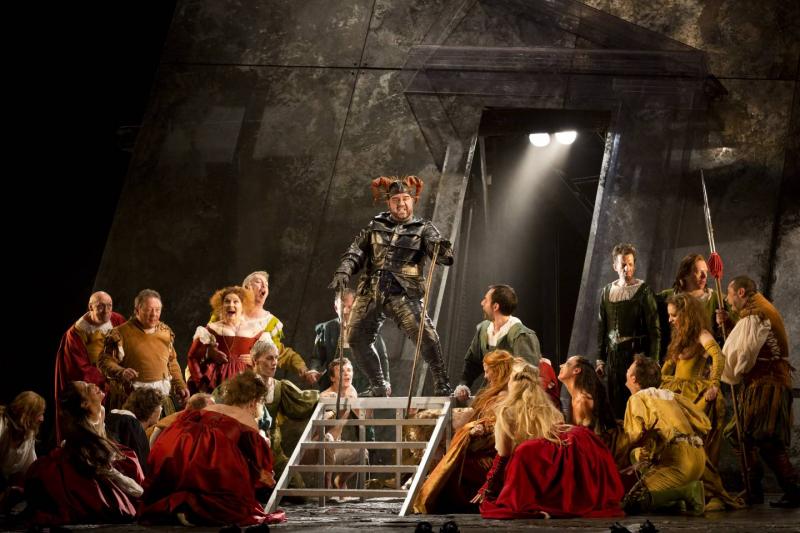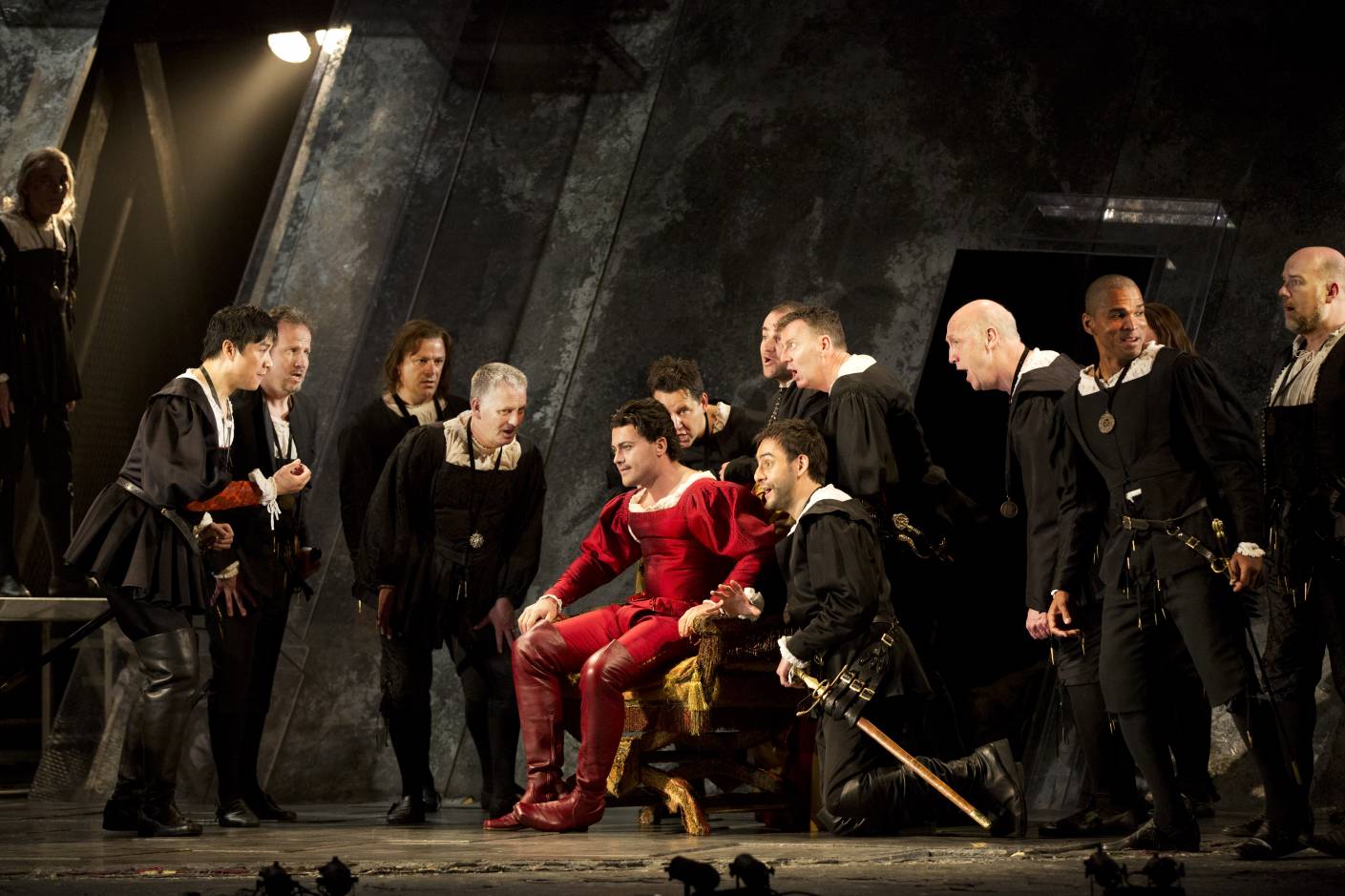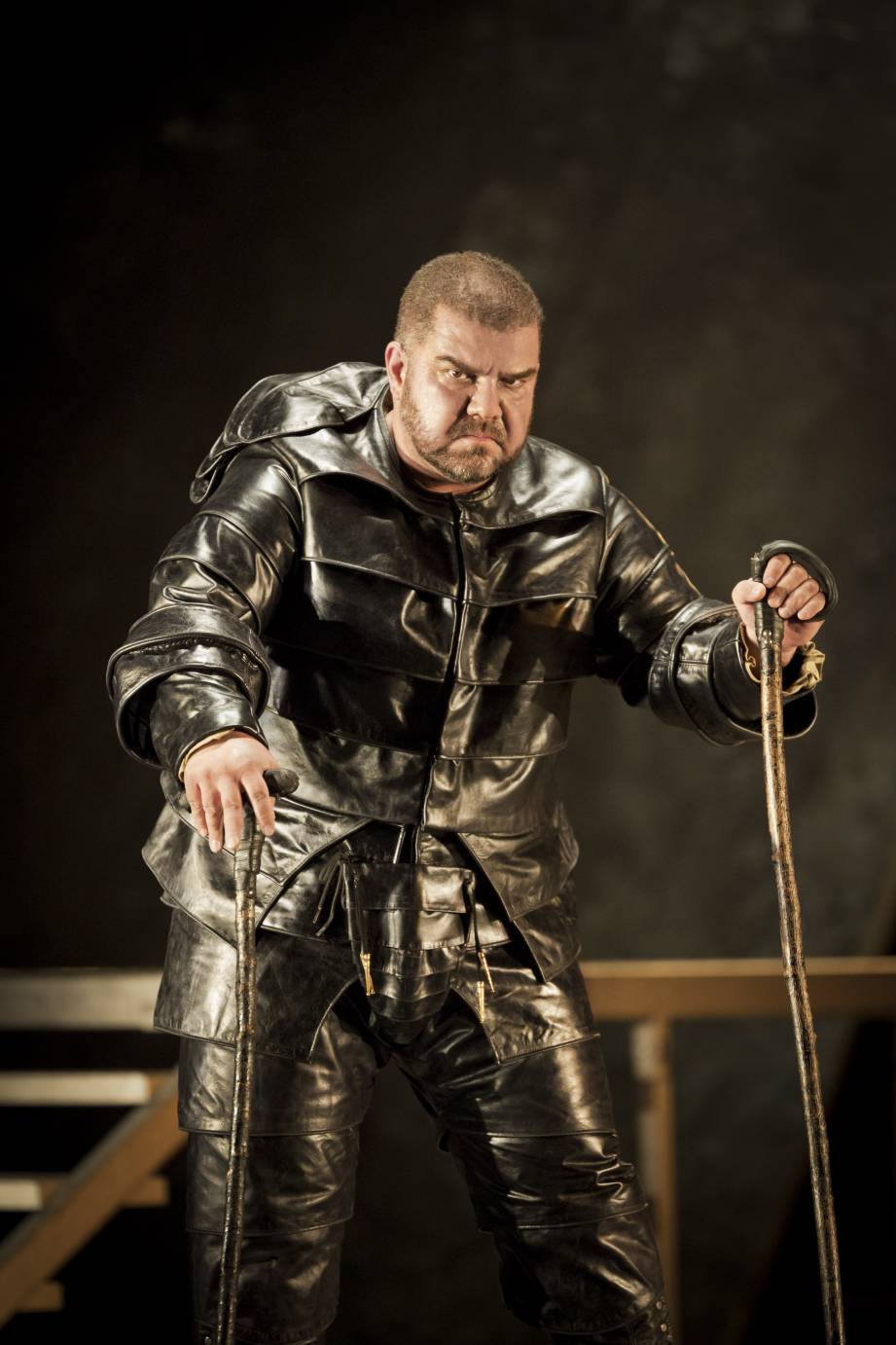Rigoletto, Royal Opera | reviews, news & interviews
Rigoletto, Royal Opera
Rigoletto, Royal Opera
A creaking set sets the tone for a rather weary revival of Verdi's tragedy

David McVicar’s Rigoletto hurls full-frontal nudity and an orgy at the audience within its opening minutes – dramatic grenades to clear the well-worn ground ahead. Back in 2001 this may have been enough to shock-and-awe, but a decade and a couple of revivals on and it takes rather more. And more we certainly get in the current revival.
As artistic battles of wills go it would be hard to imagine a tougher pair of adversaries than Gardiner and Grigolo. Gardiner’s rigorous precision, the unfussy directness of his musical lines and his lack of anything approaching indulgence is as familiar as Grigolo’s own rather more Italianate approach. Cossetting and coaxing every phrase, his is a voice that luxuriates in its own power, checking itself out in the mirror of his adoring public (cheering and applauding last night after almost every number). There’s no denying the quality of his instrument, nor its power, but his musical approach as yet lacks the flexibility to fit into all ensembles.
Spinning some beautifully controlled pianissimos, Siurina's is a poised performance
And so it was here. While Gardiner pushed forward, chivvying the Royal Opera House Orchestra into crisp, brisk little gestures, Grigolo slumped gracefully into his arias, refusing to be hurried or to make any concession to stylistic compromise. His gleaming brightness of tone and sheer volume reduced everyone else on stage to black and white, leaving Grigolo alone as the colourful foreground. It wasn’t the most generous of singing, and while “Questa o quella” and “La donna e mobile” – the young Duke’s smug expressions of his own position and power – fitted neatly into his scheme, petulance was never quite absent from his transformative moments, undermining the plausibility of Ekaterina Siurina’s swift seduction.
 Siurina is no match for Grigolo (pictured right) in terms of vocal weight, but musically much more alert to the ensemble around her. Spinning some beautifully controlled pianissimos in “V’ho ingannato”, hers is a poised performance that as yet still lacks the final gear of power for the dramatic climaxes. Christine Rice feels criminally underused as Maddalena, but acquits herself with characteristic style – a lovely earthy foil to Siurina’s delicate soprano.
Siurina is no match for Grigolo (pictured right) in terms of vocal weight, but musically much more alert to the ensemble around her. Spinning some beautifully controlled pianissimos in “V’ho ingannato”, hers is a poised performance that as yet still lacks the final gear of power for the dramatic climaxes. Christine Rice feels criminally underused as Maddalena, but acquits herself with characteristic style – a lovely earthy foil to Siurina’s delicate soprano.
All ears however were on Greek baritone Dimitri Platanias (pictured below), making his first appearance at the Royal Opera House. Physically as solid as his voice, he cuts an unusually youthful and sturdy figure in the role of Rigoletto, despite McVicar’s best attempts to weaken him with two walking sticks. His evident physical power rather undermines the pathos of proceedings, unbalancing the power dynamic even in the face of Grigolo’s overwhelmingly virile Duke.
 Vocally we see something of the same problem; beautifully even through the range and strong at the extremes, his is a quality baritone, but lacks character and sensitivity in the delivery. If Grigolo was guilty of fussing over every nuance, of curving every melodic straight line, then Platanias suffered the opposite. Interior moments – his discovery of Gilda in Act III, his stealthy confrontation with the kidnappers – risked baldness, so impersonal were they. As to dramatic arc or character, perhaps it was his awkwardly armadillo-like armour, but little attempt at either of these was able to penetrate out and reach the audience.
Vocally we see something of the same problem; beautifully even through the range and strong at the extremes, his is a quality baritone, but lacks character and sensitivity in the delivery. If Grigolo was guilty of fussing over every nuance, of curving every melodic straight line, then Platanias suffered the opposite. Interior moments – his discovery of Gilda in Act III, his stealthy confrontation with the kidnappers – risked baldness, so impersonal were they. As to dramatic arc or character, perhaps it was his awkwardly armadillo-like armour, but little attempt at either of these was able to penetrate out and reach the audience.
Gardiner may be best-known as a period specialist, but he is by no means new to the later repertoire. It’s too easy an argument to see the Baroque textures at work here, but it is perhaps the only explanation for the rather bloodless rendition we got last night. Bringing unexpected clarity to Verdi’s chamber textures (moments for oboe and cello during Rigoletto’s plea for the return of Gilda, and some beautiful orchestral characterisation during Rigoletto’s first encounter with Sparafucile), his climaxes however lacked momentum and weight. And the less said about the mess the Royal Opera’s brass section made of the lowering opening (here was unease of quite the wrong kind), or the battle of tempos between chorus and offstage band, the better.
McVicar’s production is a characteristic mash-up of medieval and contemporary elements, and, judging by the creaking of the revolve, is getting as tired physically as it is beginning to look visually. There’s just too much fuss here, both dramatically and in the competing musical accounts of the opera offered by Gardiner and his cast. Amongst it all Verdi’s tragedy is all but lost.
- Rigoletto is at The Royal Opera House until 21 April
Explore topics
Share this article
The future of Arts Journalism
You can stop theartsdesk.com closing!
We urgently need financing to survive. Our fundraising drive has thus far raised £49,000 but we need to reach £100,000 or we will be forced to close. Please contribute here: https://gofund.me/c3f6033d
And if you can forward this information to anyone who might assist, we’d be grateful.

Subscribe to theartsdesk.com
Thank you for continuing to read our work on theartsdesk.com. For unlimited access to every article in its entirety, including our archive of more than 15,000 pieces, we're asking for £5 per month or £40 per year. We feel it's a very good deal, and hope you do too.
To take a subscription now simply click here.
And if you're looking for that extra gift for a friend or family member, why not treat them to a theartsdesk.com gift subscription?
more Opera
 The Makropulos Case, Royal Opera - pointless feminist complications
Katie Mitchell sucks the strangeness from Janáček’s clash of legalese and eternal life
The Makropulos Case, Royal Opera - pointless feminist complications
Katie Mitchell sucks the strangeness from Janáček’s clash of legalese and eternal life
 First Person: Kerem Hasan on the transformative experience of conducting Jake Heggie's 'Dead Man Walking'
English National Opera's production of a 21st century milestone has been a tough journey
First Person: Kerem Hasan on the transformative experience of conducting Jake Heggie's 'Dead Man Walking'
English National Opera's production of a 21st century milestone has been a tough journey
 Madama Butterfly, Irish National Opera review - visual and vocal wings, earthbound soul
Celine Byrne sings gorgeously but doesn’t round out a great operatic character study
Madama Butterfly, Irish National Opera review - visual and vocal wings, earthbound soul
Celine Byrne sings gorgeously but doesn’t round out a great operatic character study
 theartsdesk at Wexford Festival Opera 2025 - two strong productions, mostly fine casting, and a star is born
Four operas and an outstanding lunchtime recital in two days
theartsdesk at Wexford Festival Opera 2025 - two strong productions, mostly fine casting, and a star is born
Four operas and an outstanding lunchtime recital in two days
 The Railway Children, Glyndebourne review - right train, wrong station
Talent-loaded Mark-Anthony Turnage opera excursion heads down a mistaken track
The Railway Children, Glyndebourne review - right train, wrong station
Talent-loaded Mark-Anthony Turnage opera excursion heads down a mistaken track
 La bohème, Opera North review - still young at 32
Love and separation, ecstasy and heartbreak, in masterfully updated Puccini
La bohème, Opera North review - still young at 32
Love and separation, ecstasy and heartbreak, in masterfully updated Puccini
 Albert Herring, English National Opera review - a great comedy with depths fully realised
Britten’s delight was never made for the Coliseum, but it works on its first outing there
Albert Herring, English National Opera review - a great comedy with depths fully realised
Britten’s delight was never made for the Coliseum, but it works on its first outing there
 Carmen, English National Opera review - not quite dangerous
Hopes for Niamh O’Sullivan only partly fulfilled, though much good singing throughout
Carmen, English National Opera review - not quite dangerous
Hopes for Niamh O’Sullivan only partly fulfilled, though much good singing throughout
 Giustino, Linbury Theatre review - a stylish account of a slight opera
Gods, mortals and monsters do battle in Handel's charming drama
Giustino, Linbury Theatre review - a stylish account of a slight opera
Gods, mortals and monsters do battle in Handel's charming drama
 Susanna, Opera North review - hybrid staging of a Handel oratorio
Dance and signing complement outstanding singing in a story of virtue rewarded
Susanna, Opera North review - hybrid staging of a Handel oratorio
Dance and signing complement outstanding singing in a story of virtue rewarded
 Ariodante, Opéra Garnier, Paris review - a blast of Baroque beauty
A near-perfect night at the opera
Ariodante, Opéra Garnier, Paris review - a blast of Baroque beauty
A near-perfect night at the opera
 Cinderella/La Cenerentola, English National Opera review - the truth behind the tinsel
Appealing performances cut through hyperactive stagecraft
Cinderella/La Cenerentola, English National Opera review - the truth behind the tinsel
Appealing performances cut through hyperactive stagecraft

Add comment